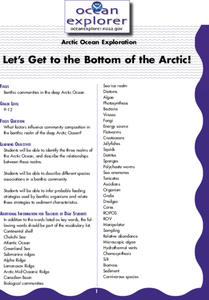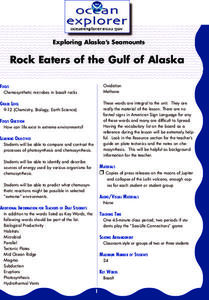Curated OER
Let's Get to the Bottom of the Arctic!
Students identify the three realms of the Arctic Ocean, and describe the relationships between these realms. They describe different species associations in a benthic community.
Curated OER
All That Glitters...
Students study that white light (visible light) is comprised of all colors of the spectrum. They study that the quantity of light decreases with increasing depth in the ocean. They study that the quality of light changes with increasing...
Curated OER
Spawn!
Students explain that the ability of certain reef fishes to have a successful spawning is dependent on numerous environmental conditions. They list some of the factors needed by reef fishes in the South Atlantic Bight to have a
Curated OER
One Tough Worm
Students explain the process of chemosynthesis. They are able to explain the relevance of chemosynthesis to biological communities in the vicinity of cold seeps.
Curated OER
This Old Tubeworm
Students explain the process and significance of chemosynthesis. They develop their own graphic based on data of a biological community. They estimate the age of a given species as well.
Curated OER
Feeling Crabby?
Students analyze data to investigate the influence of water depth on size among deep-water crabs. They interpret results from this data, and apply the results regarding appropriate fishery regulations.
Curated OER
Rock Eaters of the Gulf of Alaska
Students compare and contrast the processes of photosynthesis and chemosynthesis. They identify and describe sources of energy used by various organisms for chemosynthesis.
Curated OER
AdVENTurous Findings on the Deep Sea Floor
Learners conduct investigations to observe formations of precipitates, then create models of developing hydrothermal vents. They compare the models with the actual hydrothermal vents developing along the Galapagos Rift.
Curated OER
Yo-Yos, Tow-Yos and pH, Oh My!
Young scholars explore how hydrothermal vents are formed and where they are located on the ocean floor. They study how scientists use CTDs to locate hydrothermal vents.
Curated OER
Famous Figures in History
Pupils investigate famous people in U.S. history. In this American history lesson plan, students read about famous people such as Helen Keller and Einstein. Pupils think of ways they might become famous.
PBS
Pbs Teachers: Sound and Fury: Deaf and Diverse
Identify beliefs, values and attitudes of deaf culture. Explore the causes and special communication needs of deafness, research the role that American Sign Language plays in forging a sense of community and create your own "sign name".
Alabama Learning Exchange
Alex: Helen Keller
During this lesson, learners learn about the life of Helen Keller and how she communicated with others. Students have the opportunity to use sign language to communicate with others. Learners gain an appreciation for their sight and...













